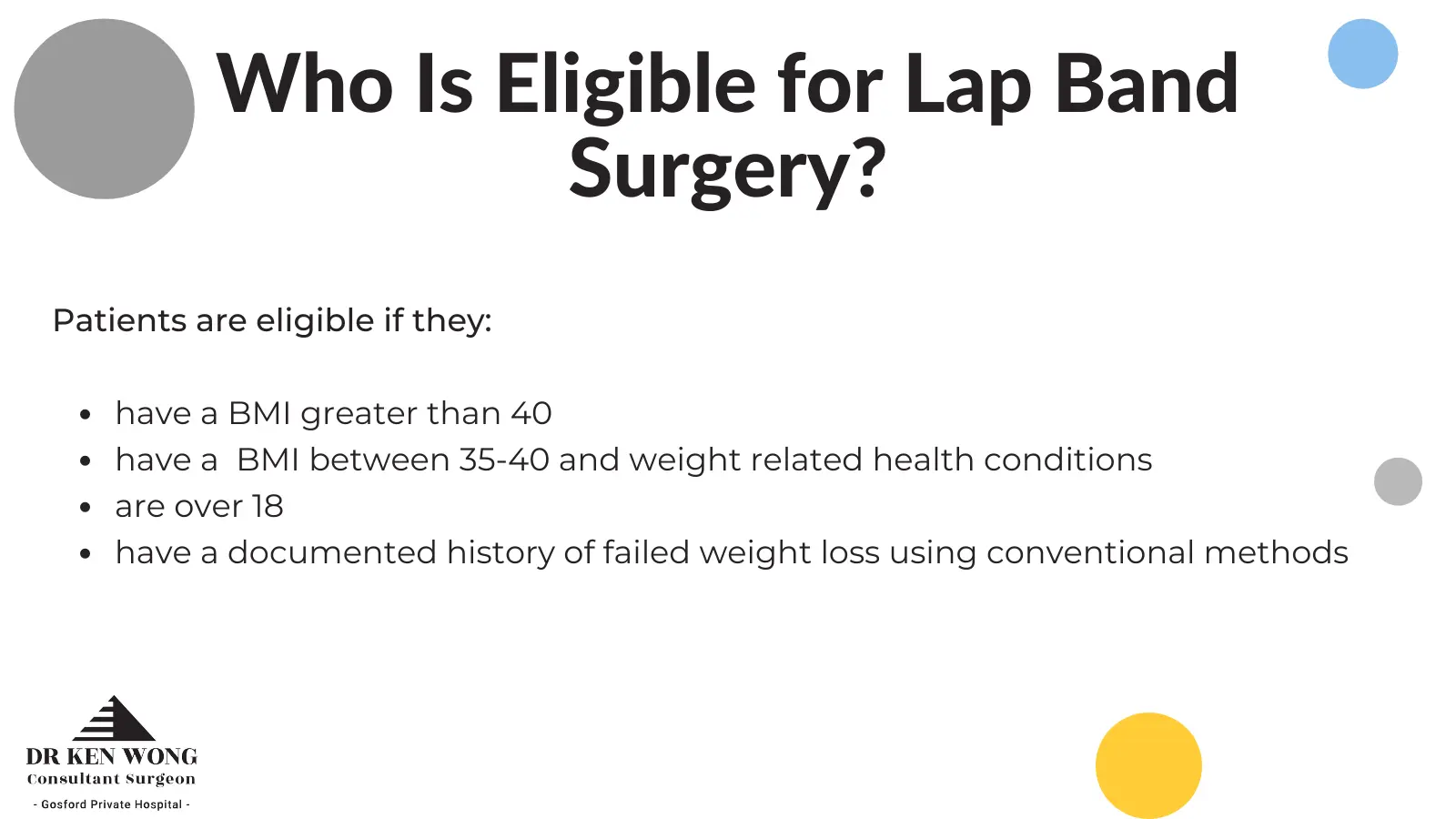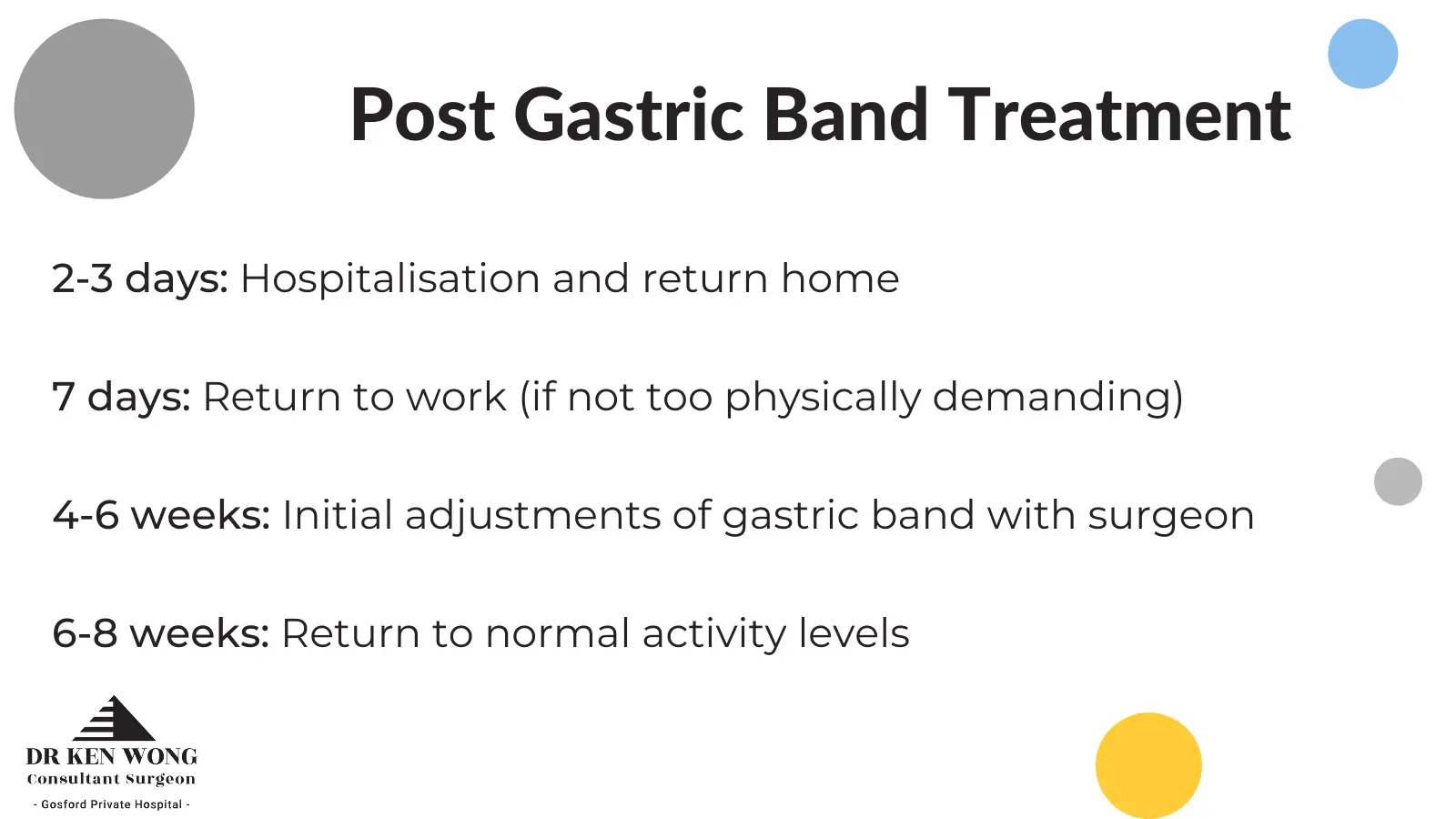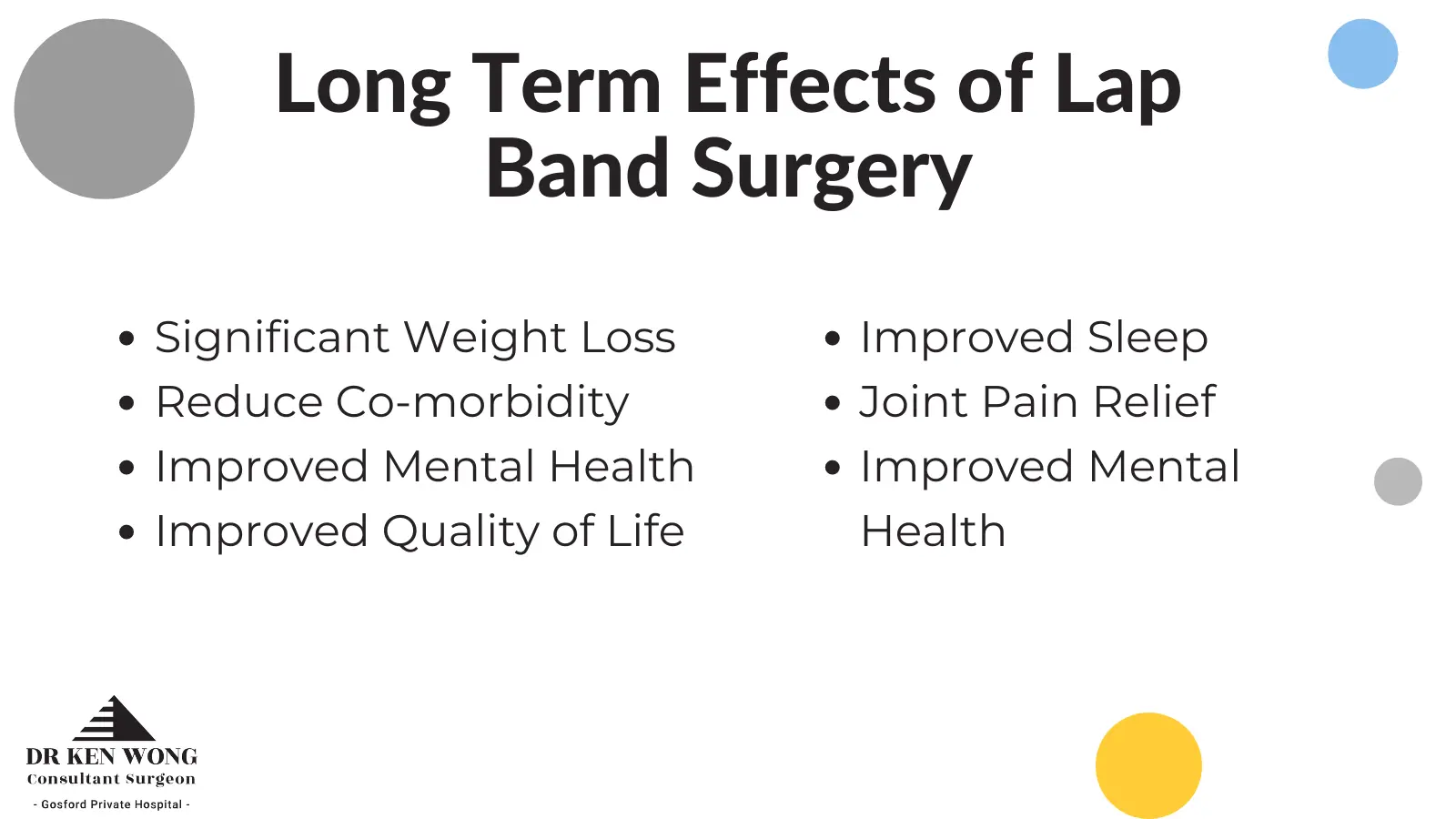Are you looking to undergo lap band surgery or have recently had the procedure performed and are wondering “How long does lap band surgery last?”
A laparoscopic adjustable gastric band, referred to as a gastric or lap band surgery, is performed to improve the health and wellbeing of morbidly obese patients. The gastric band reduces the effective size of the stomach and allows patients to feel more satiated with less food. While an excellent procedure, we are often asked, “How long does lap band surgery last?” and “What are the long-term effects of lap band surgery?”
How Long Does Lap Band Surgery Last?
Lap band surgery is intended to last a lifetime. Usually made from a durable silicone material, lap bands do not disintegrate and do not require removal unless complications arise or at a patients request.
Who Is Eligible?
Lap band surgery is eligible for significantly overweight patients with a BMI greater than 40kg/m2 or 35-40kg/m2 if they have weight-related health conditions such as hypertension or diabetes. Most patients will also need a history of failed weight loss attempts using more conventional methods. Additionally, this procedure is only suitable for adults over the age of 18 years.

How Will I Feel After Gastric Band Surgery?
While every patient’s recovery varies, gastric band surgery has a relatively brief hospitalisation and recovery period compared to a gastric bypass procedure. As with any surgery, patients will feel some pain and discomfort, which they can treat with medication. Most patients can return to work after one week if their job is not too physically demanding.
How Long Does Lap Band Surgery Last Before Needing Adjustment?
Approximately four to six weeks after your surgery, a patient will visit their clinician for a series of routine procedures to adjust their band. This involves the surgeon injecting saline into the port of the gastric band to tighten it. Tightening the band will enhance weight loss and assist in the case of a plateau.
Is gastric band reversible? If you are experiencing adverse effects such as nausea and vomiting, the surgeon can loosen the band and even remove it if necessary
At approximately six weeks, the patient can resume normal activity levels and continue their weight loss journey.
Can a Gastric Band Be Removed?
Can a gastric band be reversed after losing a substantial amount of weight?
Yes, this can occur, but it is very rare. Most patients do not have their gastric band removed. Unfortunately, many patients are prone to regaining the weight they have lost. To achieve long term positive health outcomes and achieve weight loss success, your health goals must be for life.
The main factor determining a patient’s weight loss rate is their dietary and exercise choices. For the greatest success, patients must commit to making positive changes to their diet and maintaining an exercise regime. Medical professionals such as nutritionists and exercise physiologists work close with bariatric surgeons to assist patients in making and maintaining these lifestyle changes.

What Are The Long-Term Effects of Lap Band Surgery?
While it is essential to know how long does lap band surgery last, many of our patients are also curious about the long term effects of lap band surgery.
After having gastric band surgery, patients are restricted in the amount of food they can eat. With the reduced capacity, the stomach fills up quickly and suppresses an individual’s urge to eat. If patients forced themselves to eat more than their new stomach capacity, they would experience stomach pain or even vomit.
While this may seem confronting, the gastric band procedure and use of a lap band is an intervention that is required when patients have exhausted all other options.
Significant Weight Loss
The long term effects of lap band surgery are generally very positive, but it is up to the patient to maintain their weight loss regimen and stick to their new lifestyle. Patients can expect to lose between 0.75kg and 1.5kg a week in the initial periods after the surgery. In the long term, this settles down to around 0.5kg per week.
Patients can expect to lose up to 40% of their excess weight in the first year and between 10-20% in the second. After a year and a half, the rate of weight loss will be much slower as a substantial amount of excess body weight has been lost.
Reduced Co-morbidity
When discussing how long does lap band surgery last, the good news is it lasts for life and reduces the impact of many other weight-related diseases.
After Gastric Band Surgery, the associated weight and lifestyle improvements also assist in reducing the comorbidities of patients. Comorbidity is the presence of two or more conditions in a person at the same time. These can include diabetes, heart disease and high blood pressure. Patients will see improvements to varying degrees as every body and condition is different.
Improved Mental Health
Many obese people struggle with depression, body image, and social stigma. Losing excess body weight has a multitude of benefits for a patient’s mental health. Many studies have documented lower rates of depression after gastric band surgery and successful weight loss, along with increased physical and social confidence.
Improved Sleep
Obstructive sleep apnoea affects many obese individuals. About 12 months after the surgery, many patients experience a significant improvement in their sleep and a reduction in sleep apnoea.
Joint Pain Relief
Carrying around excess weight puts a significant strain on the joints within the body. Joint pain and excess weight go hand in hand at reducing obese individuals’ quality of movement. Significant and sustained weight loss after the lap band surgery complemented with exercise reduces joint pain and the requirement of pain medication to treat it. As patients progress further and further along their weight loss journey, they will also see a substantial improvement in their quality of movement and motivation to exercise.
Improved Quality of Life
Combining all the long term effects of lap band surgery above, many patients see an improvement in their quality of life. Improved mental health and social interaction with a reduction in chronic pain and comorbidity translate across all aspects of an individual’s life. Whether it is being able to try new things, spend better quality time with loved ones, or simply feeling better about themselves, a significant number of patients report an improved quality of life after their surgery.
In some instances, complications may arise after gastric band surgery if a patient fails to make the necessary diet and lifestyle changes, does not attend follow up medical appointments or experiences gastric band complications. These issues include band erosion, slippage, and infection but can be managed with your surgeon and reversed with lap band removal surgery. So, can a gastric band be removed, or reversed?

Can a Gastric Band Be Reversed?
In most cases, there are many positive long term effects of lap band surgery; however, in some cases, there are individuals who wish or require their lap band to be removed. So, can a gastric band be removed? Yes. Surgeons can remove the gastric band from the stomach if needed. Before conducting the surgery, an experienced surgeon will review your medical history and why you wish to have the band removed.
How Is Gastric Band Reversible?
While the lap band is a device fitted around the stomach and can be removed due to its non-destructive nature, other procedures such as a gastric sleeve are irreversible. In a gastric sleeve procedure, the surgeon divides a section of the patient’s stomach and staples together the remaining portion to form the sleeve. As part of the stomach is removed, the surgery is irreversible. For those hesitant about undergoing any bariatric surgery, the reversible nature of lap band surgery is a positive aspect to consider.
Even better, if your initial surgery was completed laparoscopically, the surgeon can use the initial incisions. Using the existing incision points makes it easier for the surgeon and reduces additional scarring or complications for the patient.
Your surgeon can adjust the gastric band after surgery, depending on your situation. For those who are still consuming too much food and liquid, the band can be tightened. On the other hand, if you are having difficulty keeping down food and fluid, it can be loosened.
So, is gastric band reversible? Yes, but it is not something to take lightly. A patient will not require further surgical procedures after their initial lap band surgery in an ideal circumstance.
Choose the Right Surgeon for Your Procedure
It is essential to choose a surgeon you trust and who understands your situation when undergoing any surgery. Any bariatric surgery requires significant screening, expert medical professionals, and a commitment from the patient to make positive long term lifestyle changes. At Central Coast Surgery, we understand that weight loss is a long-term journey. We have a whole team of medical professionals who are with you every step of the way and are happy to answer all your questions, including, “How long does lap band surgery last?”.
If you are considering a bariatric procedure including lap band surgery, gastric sleeve or bypass, get in touch with our team today. Dr Ken Wong and the Central Coast Surgery team are committed to providing expert treatment and surgical procedures for their patients. For more information or to book a consultation, contact the Central Coast Surgery Team today.
